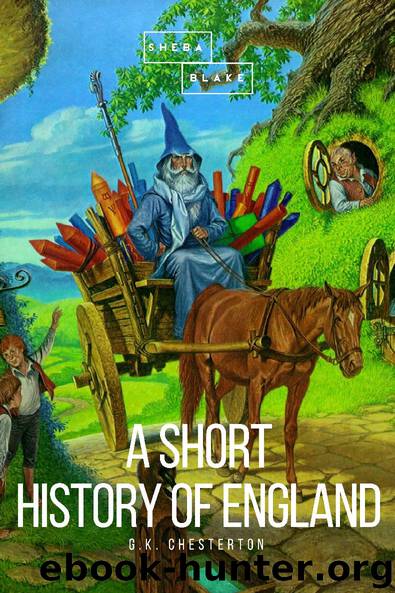A Short History of England by G.K. Chesterton

Author:G.K. Chesterton [Chesterton, G.K.]
Language: eng
Format: epub
Publisher: manybooks.net
XI
THE REBELLION OF THE RICH
Sir Thomas More, apart from any arguments about the more mystical meshes in which he was ultimately caught and killed, will be hailed by all as a hero of the New Learning; that great dawn of a more rational daylight which for so many made mediævalism seem a mere darkness. Whatever we think of his appreciation of the Reformation, there will be no dispute about his appreciation of the Renascence. He was above all things a Humanist and a very human one. He was even in many ways very modern, which some rather erroneously suppose to be the same as being human; he was also humane, in the sense of humanitarian. He sketched an ideal, or rather perhaps a fanciful social system, with something of the ingenuity of Mr. H. G. Wells, but essentially with much more than the flippancy attributed to Mr. Bernard Shaw. It is not fair to charge the Utopian notions upon his morality; but their subjects and suggestions mark what (for want of a better word) we can only call his modernism. Thus the immortality of animals is the sort of transcendentalism which savours of evolution; and the grosser jest about the preliminaries of marriage might be taken quite seriously by the students of Eugenics. He suggested a sort of pacifism--though the Utopians had a quaint way of achieving it. In short, while he was, with his friend Erasmus, a satirist of mediæval abuses, few would now deny that Protestantism would be too narrow rather than too broad for him. If he was obviously not a Protestant, there are few Protestants who would deny him the name of a Reformer. But he was an innovator in things more alluring to modern minds than theology; he was partly what we should call a Neo-Pagan. His friend Colet summed up that escape from mediævalism which might be called the passage from bad Latin to good Greek. In our loose modern debates they are lumped together; but Greek learning was the growth of this time; there had always been a popular Latin, if a dog-Latin. It would be nearer the truth to call the mediævals bi-lingual than to call their Latin a dead language. Greek never, of course, became so general a possession; but for the man who got it, it is not too much to say that he felt as if he were in the open air for the first time. Much of this Greek spirit was reflected in More; its universality, its urbanity, its balance of buoyant reason and cool curiosity. It is even probable that he shared some of the excesses and errors of taste which inevitably infected the splendid intellectualism of the reaction against the Middle Ages; we can imagine him thinking gargoyles Gothic, in the sense of barbaric, or even failing to be stirred, as Sydney was, by the trumpet of "Chevy Chase." The wealth of the ancient heathen world, in wit, loveliness, and civic heroism, had so
Download
This site does not store any files on its server. We only index and link to content provided by other sites. Please contact the content providers to delete copyright contents if any and email us, we'll remove relevant links or contents immediately.
| Africa | Americas |
| Arctic & Antarctica | Asia |
| Australia & Oceania | Europe |
| Middle East | Russia |
| United States | World |
| Ancient Civilizations | Military |
| Historical Study & Educational Resources |
Elizabeth by Philippa Jones(1862)
Mary Boleyn by Alison Weir(1465)
Traitors of the Tower by Alison Weir(1359)
A Journal of the Plague Year (Oxford World's Classics) by Daniel Defoe(1228)
Eleanor of Aquitaine by Marion Meade(1084)
Moon Tiger by Penelope Lively(1070)
A Short History of England by Simon Jenkins(1066)
The Real Middle Earth by Brian Bates(1049)
Life of Pi by Yann Martel(1031)
London Under by Peter Ackroyd(1017)
Notes From a Small Island by Bill Bryson(1011)
Queen Isabella by Alison Weir(1005)
American Idol by Richard Rushfield(924)
Her Majesty's Spymaster by Stephen Budiansky(909)
Tudors Versus Stewarts by Linda Porter(906)
Albion by Peter Ackroyd(838)
Cromwell, Our Chief Of Men by Fraser Antonia(814)
The Creation of Anne Boleyn by Susan Bordo(813)
Children Of England: The Heirs of King Henry VIII 1547-1558 by Weir Alison(812)
